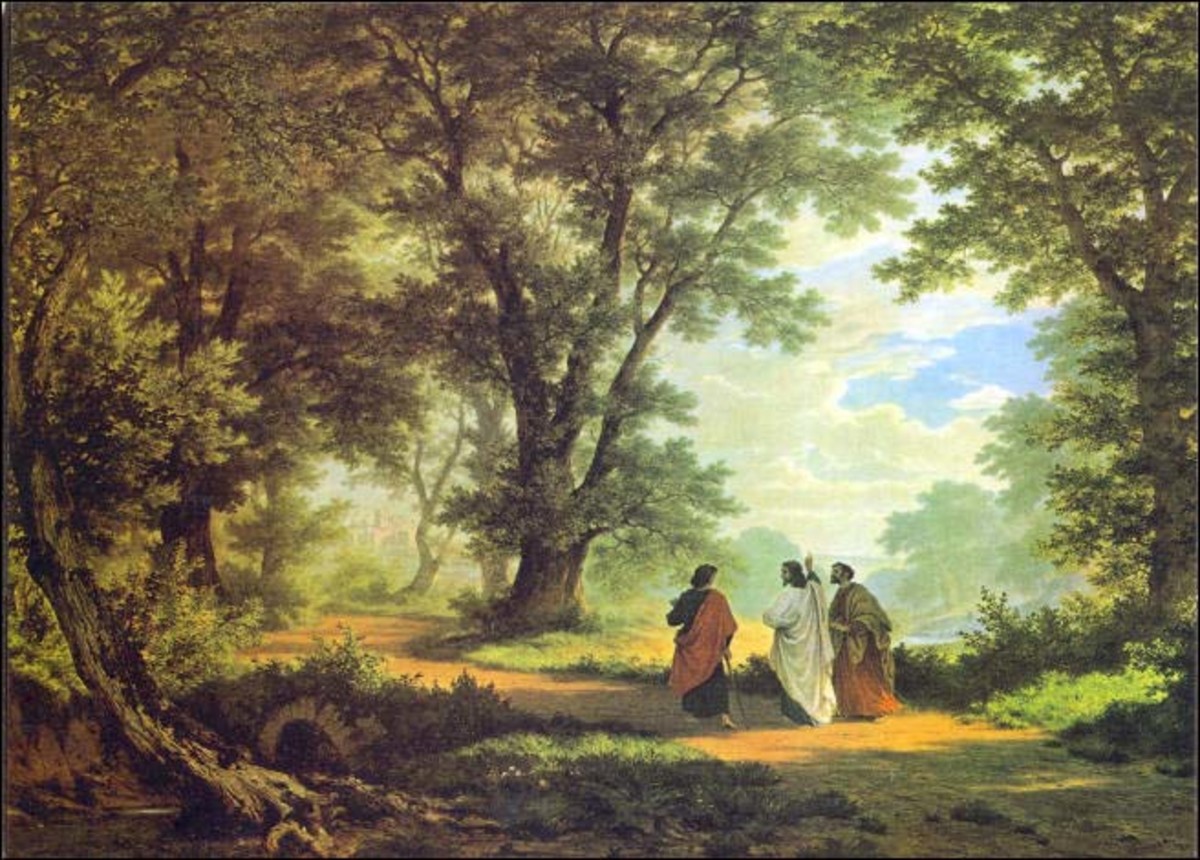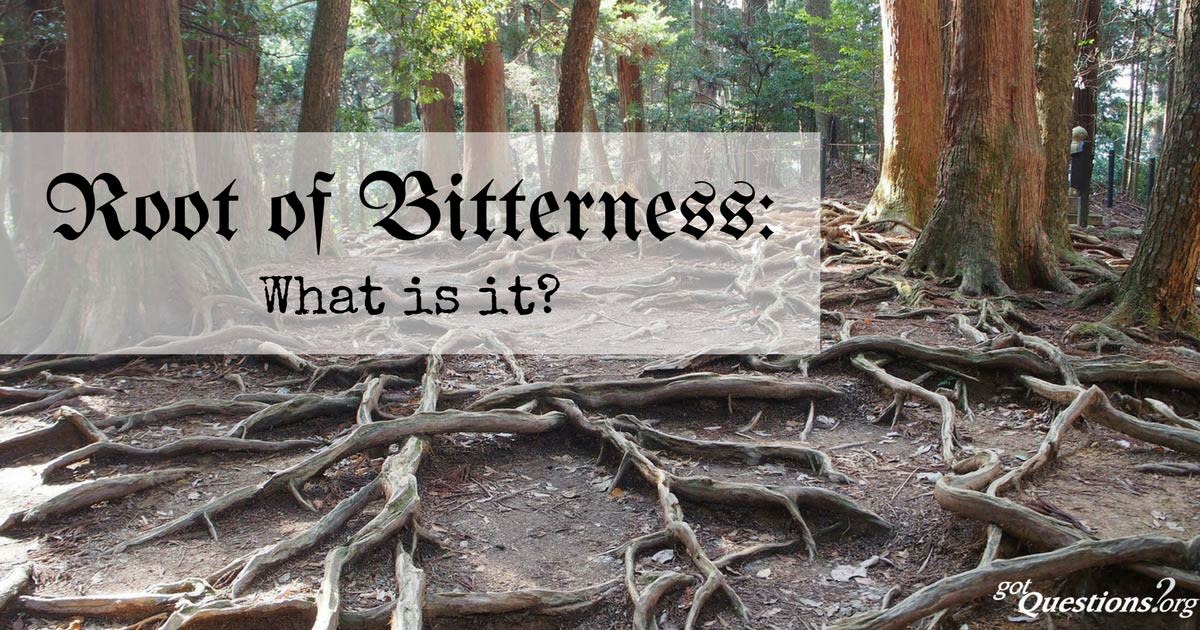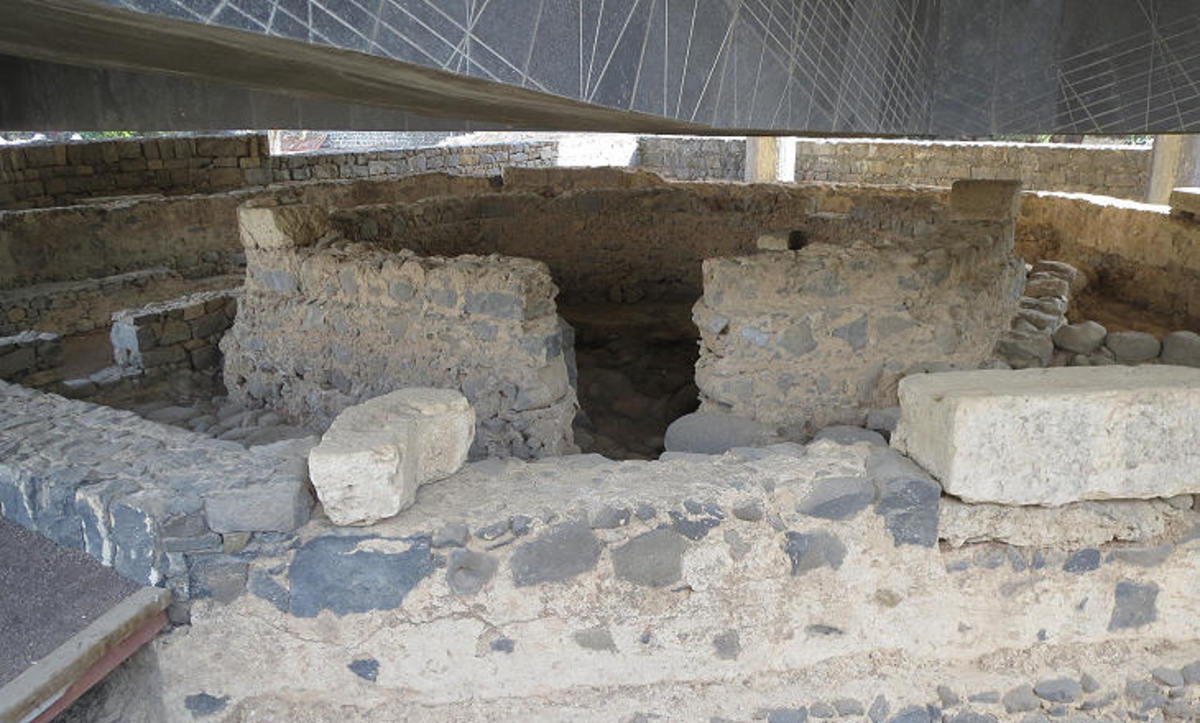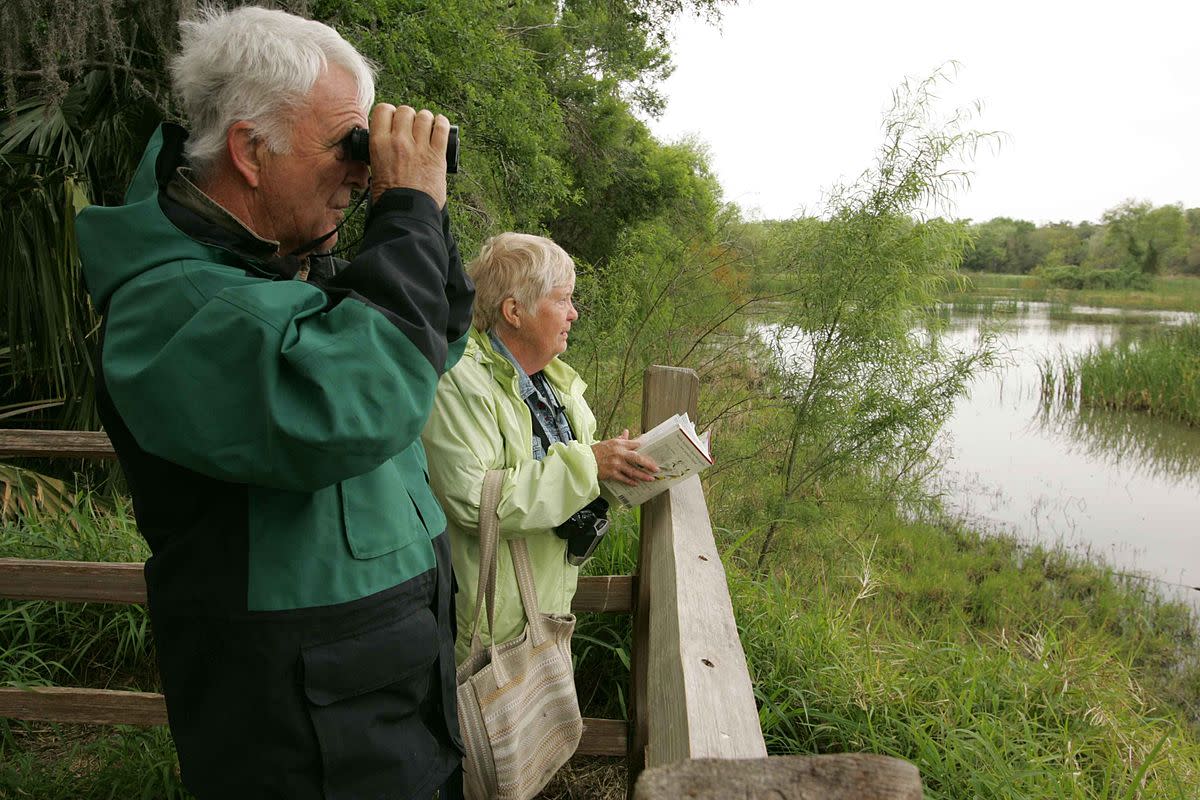Harvest in View, He Cautioned Them

Harvest in View, He Cautioned Them
Jesus cannot do without telling people parables during his life time, because he knows that by parables the word which he would speak unto them would be brought close to them, their hearts of understanding and he was by that fulfilling the words of the prophecies spoken concerning him.
“All these things spake Jesus unto the multitude in parables; and without a parable spake he not unto them:
“That it might be fulfilled which was spoken by the prophet, saying, I will open my mouth in parables; I will utter things which have been kept secret from the foundation of the world.” (Mat. 13:34-35)
It would interest my readers and all bible students to know that the gospel according to saint Matthew chapter thirteen is full of parables, the chapter has in it 8 parables, but some people do not consider the last parable which is in verse 52 to be a parable. Thus, if you belong to the school of thought, it would mean you believe it is 7 parables that the chapter contained. Whichever school you belong to out of the two groups, it is certain that the chapter is chapter of parables.
Out of the parables in the chapter, I want to talk on the second parable which was spoken by Jesus to his audience in verses 24 through 30 of the chapter which says,
“Another parable put he forth unto them, saying, the kingdom of heaven is likened unto a man which sowed good seed in his field:
“But while men slept, his enemy came and sowed tares among the wheat, and went his way.
“But when the blade was sprung up, and brought forth fruit, then appeared the tares also.
“So the servants of the householder came and said unto him, Sir, didst not thou sow good seed in thy field? from whence then hath it tares?
“He said unto them, an enemy hath done this. The servants said unto him, wilt thou then that we go and gather them up?
“But he said, Nay; lest while ye gather up the tares, ye root up also the wheat with them.
“Let both grow together until the harvest: and in the time of harvest I will say to the reapers, gather ye together first the tares, and bind them in bundles to burn them: but gather the wheat into my barn.” (Mat 13:24-30)
Harvest is mentioned 61 times in the King James Version of the bible. It is “קציר” in Hebrew word which when Romanized becomes qâtsı̂yr, (pronounced as kaw-tseer') while in Greek it is “θερισμός” and the Romanized form is therismos, (phonetical spelling is ther-is-mos') which means severed, reaped.
Harvest is very important in life; different disciplines have their harvest periods. This is the time when one brings into account what one has done over the year and or years, to know whether one’s endeavor has been productive, fruitful and should be continued or maintained or it should be dropped and look for other means of going about one’s undertakings.
Any work where one cannot sit down and evaluate the past, bring into account those things done in the past is not a good job and one would be advised to drop such endeavor and look for another.
In this second parable which Jesus shared with his followers, I will want us to see some few things from the above verses.


1(a). A Farmer: Jesus told us in the parable that the man was a farmer, a crop farmer. It would interest us to know that during those days’ technology has not taken over many spheres of life like it is today neither education. thus, if the statistics of people’s jobs were taken then, those who were farmers would take the higher percentage of the statistics of workers in the world.
(b) Types of Farmer: in the ancient times and during the days of Abraham when farming and farmers become celebrated and people started possessing wealth through farming and other types of agriculture as it we read of Abraham and Isaac his son, we would discover that the farmers could further be subdivided into groups and it would include, small scale farmers, medium scale farmers and large scale farmers.
“Then Isaac sowed in that land, and received in the same year an hundredfold: and the LORD blessed him.
“And the man waxed great, and went forward, and grew until he became very great:
“For he had possession of flocks, and possession of herds, and great store of servants: and the Philistines envied him.” (Gen 26:12-14 (emphasis mine))
The Hebrew word for servant here is “עבדּה”, which if Romanized becomes ‛ăbûddâh, (pronounced as ab-ood-daw') which means household. When someone is said to have a store of servants, it means the person would have more than twelve regular servants working under him, people who are in his pay rolls.
“Great store of servants” however, the bible here adds that the servants he has were “great”, which would invariably mean it would be in the multiples of twelve. For someone who has workers in that range such a one would be called a large-scale farmer.
This is the position Isaac and his father occupied for we read of his father, Abraham that apart from those working on the farmlands for him he equally had people trained for war, and out of those we read that over three hundred soldiers were taken to rescue Lot his nephew when the enemies attacked Sodom and Gomorrah.
“And when Abram heard that his brother was taken captive, he armed his trained servants, born in his own house, three hundred and eighteen, and pursued them unto Dan.” (Gen 14:14 (emphasis mine))
So, someone who has over three hundred people as security personnel one could view the expanse of his farm, the expanse of his possession, it is obviously sure that such a one is not a medium scale farmer.
We can compare the above examples with another example in the book of judges of the man called Gideon we shall see that this man and his father were low-scale farmers. We may say it was because of the servitude which they were under then, but I want to believe that assuming his father has many servants he would have compelled those servants to follow his son to the farm as Kish compelled his servant to accompany Saul when his asses went missing with the servants shepherding those cattle. Let us read the two from the scriptures for comparison because the bible says, “for precept must be upon precept, precept upon precept; line upon line, line upon line; here a little, and there a little:” (Isa 28:10), bible cannot be treated in isolation.
“And there came an angel of the LORD, and sat under an oak which was in Ophrah, that pertained unto Joash the Abiezrite: and his son Gideon threshed wheat by the winepress, to hide it from the Midianites.” (Jdg 6:11)
Gideon was alone working assuming they were two, when the angel appeared, he would have been bold because the presence of another person by his side would give him boldness such that he would draw out his sword with the aim of fighting the angel as Joshua did when he was leading the Israelis.
“And it came to pass, when Joshua was by Jericho, that he lifted up his eyes and looked, and, behold, there stood a man over against him with his sword drawn in his hand: and Joshua went unto him, and said unto him, Art thou for us, or for our adversaries?
“And he said, Nay; but as captain of the host of the LORD am I now come. And Joshua fell on his face to the earth, and did worship, and said unto him, What saith my lord unto his servant?
“And the captain of the LORD'S host said unto Joshua, loose thy shoe from off thy foot; for the place whereon thou standest is holy. And Joshua did so.” (Jos 5:13-15)
He was not bold because there is no one accompanying him, he was man alone in the field working. When we have a companion, we are usually bold, that I believe is one of the reasons for the author of the book of Ecclesiastes saying two is better than one.
“Two are better than one; because they have a good reward for their labour.” (Ecc. 4:9)
When we have a companion, and we have the same mind, in unity, we can talk to the mountains to be moved and it will be moved.
Let us now see the second person I talked about who is the son of Kish, Saul, before he became the King over Israel, his father asked him to take one of his servants because there are many servants to go and search for the missing asses.
“Now there was a man of Benjamin, whose name was Kish, the son of Abiel, the son of Zeror, the son of Bechorath, the son of Aphiah, a Benjamite, a mighty man of power.
“And he had a son, whose name was Saul, a choice young man, and a goodly: and there was not among the children of Israel a goodlier person than he: from his shoulders and upward he was higher than any of the people.
“And the asses of Kish Saul's father were lost. And Kish said to Saul his son, take now one of the servants with thee, and arise, go seek the asses.
“And he passed through mount Ephraim, and passed through the land of Shalisha, but they found them not: then they passed through the land of Shalim, and there they were not: and he passed through the land of the Benjamites, but they found them not.
“And when they were come to the land of Zuph, Saul said to his servant that was with him, Come, and let us return; lest my father leave caring for the asses, and take thought for us.” (1 Sa 9:1-5)
What I am pointing out is that those who have servants would hardly allow their children to be alone working in the farms as it happened to Gideon that was why he said his family was poor in Israel while talking with the angel.
“And he said unto him, Oh my Lord, wherewith shall I save Israel? Behold, my family is poor in Manasseh, and I am the least in my father's house.” (Jdg 6:15)
From the above we could see types of farmers in Israel those days, and those types of farmers were yet in existence when Jesus was on the planet, thus he made the illustration along the line unto his listeners to make them understand what he was speaking unto them.
2. Many Members of Staff: This householder has many workers, servants working for him on the farm. The time of recruiting the servants were not stated as it was stated in the parable, he puts forward in chapter 20 of the book of Matthew.
“For the kingdom of heaven is like unto a man that is an householder, which went out early in the morning to hire labourers into his vineyard.
“And when he had agreed with the labourers for a penny a day, he sent them into his vineyard.
“And he went out about the third hour, and saw others standing idle in the marketplace,
“And said unto them; Go ye also into the vineyard, and whatsoever is right I will give you. And they went their way.
“Again he went out about the sixth and ninth hour, and did likewise.
“And about the eleventh hour he went out, and found others standing idle, and saith unto them, why stand ye here all the day idle?
“They say unto him, because no man hath hired us. He saith unto them, go ye also into the vineyard; and whatsoever is right, that shall ye receive.” (Mat 20:1-7)
You will see in this parable that the time of employing those servants differ, some were employed early while other were employed at the wee hours of the working hours of the day as the householder (farmer) seemly finds fit.
Whether or not they were employed at the same time or at different times of the day, it was sure that the farmland was an expanse land which requires additional hands for the completion of the work on the farmland.
3. Type of Farmer in This Parable: As earlier stated that the types of farmer could be low-scale or large-scale farmer. The low scale farmer is essential for all household because the bible enjoins all men to provide for his own household. Thus, if a farmer cannot practice extensive one, the farmer should be able to practice the low-scale farming to provide for his household.
“But if any provide not for his own, and specially for those of his own house, he hath denied the faith, and is worse than an infidel.” (1 Ti 5:8)
As we could see from the book that the bible says the man was approached by his “servants” (Mat. 13:27) it is logical to say that the man is a large-scale farmer.
4. Rest: after a strenuous day’s work it is advisable that one takes rest and this was what the man in the parable did alongside with his servants.
“But while men slept, his enemy came and sowed tares among the wheat, and went his way.” (Mat 13:25)
The Greek word for “slept” here is “καθεύδω”, Romanized form is katheudō (pronounced as kath-yoo'-do) which means to lie down to rest, to fall asleep.
This householder after a tireless activity on the farm decided to rest, he slept off because he knows that by doing that, he would have vigor to continue with other farm activities the following day together with his servants.
After strenuous day’s work in the bible Jesus also calls apart his disciples to rest, he by this is showing all and sundry the importance of rest in life and the world, it is disturbing that some today do not have time to rest, we need to know that it is a person who is alive who can think of other things in the future a dead person has no thought again, no wishes again, all his wishes and hopes have died with him or her.
“And he said unto them, Come ye yourselves apart into a desert place, and rest a while: for there were many coming and going, and they had no leisure so much as to eat.” (Mar 6:31)
As believers we should strive to create time and avenues for ourselves to be resting after a day’s work or after doing strenuous work during the week. It is important. This farmer gave himself rest neither did he deny his servants rest. And this is worrying for some masters would be putting strenuous pressures on their servants they would not allow them to rest and shortly after there would be diminishing returns in the output of those servant because his brain has reached the optimum without resting. We, as Masters, need to allow our servants to always be resting so that they would be more productive the following day, so that they would have time to think about the work they are doing for us and would be able to map out new strategies for the work’s progress and advancements.

5. Adversary Struck: it was quite unfortunate that when the man and his servants were resting the enemies entered the farm sow (scatter) strange seeds into the farm.
“But while men slept, his enemy came and sowed tares among the wheat, and went his way.” (Mat 13:25)
The Greek word for enemy here is “ἐχθρός”, and the Romanized form of this word is echthros (pronounced as ekh-thros') which means foe, odious, hostile, adversary.
It is still real that the devil is our adversary in the world, and he roars about seeking whom to devour.
“Be sober, be vigilant; because your adversary the devil, as a roaring lion, walketh about, seeking whom he may devour:” (1 Pe 5:8 (Emphasis mine))
The Greek word for sober is “νήφω’, Romanized form is nēphō (pronounced as nay'-fo) which means be discreet, be watchful.
And the Greek word for vigilant is “γρηγορεύω”, which if Romanized becomes grēgoreuō, and it has this phonetic spelling gray-gor-yoo'-o; it means to keep awake, awake.
As seen above we can see that Apostle Peter is telling the saints in whom you and I are one that we need to be discreet. Google defines discreet as being careful and prudent in one's speech or actions, especially in order to keep something confidential or to avoid embarrassment. We are enjoined to keep our words, think before we speak lest we speak our lives into the hands of the enemies who will go all out to truncate our ambition or plans.
In addition to this he adds that we need to keep awake. Is this man of God suggesting that we do not sleep again? No, that is not what it means. What the man of God is saying to us is that we should be spiritually alert always and should not give room to the enemies in any form whatsoever, it is when we do these that we shall be “resist(ing) stedfast in the faith…” (1 Pe 5:9) the devil.
6. Planned Work: What the enemies done cannot be immediately deciphered because the good seeds planted were few hours planted before the bad (unwanted) seeds were planted. And according to agricultural studies seeds planted in the soil would stay for some days inside the soil before it germinates, and the blade of the leaves started appearing. The least of the days is three days, 72 hours for some monocotyledon plants.
The enemies know when it would strike, and it is at the time when their deeds cannot be instantly unraveled that they struck.
Here in shall we note that enemies do not strike at any time, they do not attack as if they do not have plans, they used to plan very well, calculate their steps before they attack and that essentially was what happened here, for the enemies did not attack when they know the seeds have germinated, but they attacked when the seeds were still undergoing physiological changes in the soil.
This planned work makes it extremely difficult for the householder and his servants to know what has been wrought on the farmland and on the seed in particular.
Even, if this farmer has some spiritual insights to know the seemingly hidden things, yet little could be done about what has happened because any attempt to try anything would result in total set-back.
7. Servants Are Dedicated And Observant: An intrigue thing about the servants of this farmer is that they are all committed to the work, they are all observant of what was going on, on the farmland.
Many servants today are not observant, they are not committed to the work they are doing and that is not good enough. The bible says, “whatsoever thy hand findeth to do, do it with thy might; for there is no work, nor device, nor knowledge, nor wisdom, in the grave, whither thou goest” (Ecc 9:10)
Some people will say they get the job when they cannot readily get the one their hearts desire to do, some will say, they agree to this to show some people some things. Now, after they have agreed to doing what they said they agreed to, they will be doing it anyhow, they will not be committed to doing the work as they ought to be committed to it. This is not the right attitude to it. They have blocked the chance of the management employing another staff into that position, and yet they are not doing the work well, they are drawing the work back, slowing down things and or setting the work back. This should not be said of us as believers. Whatever you will not be committed to, you shouldn’t do it, a job that you will not be committed to with your heart you should not take up the appointment.
This is also related to the way of salvation, if you know you would not be committed to Jesus Christ, do not feign salvation, do not present yourself as a believer to win the hearts of some people over, it is those who will be committed to salvation that God looks forward to become saved.
8. Servants Met: After noticing this, those servants, perhaps those who were permanently on the pay roll of the man met to discuss what they noticed after the blades of the sown seeds started appearing.
“So the servants of the householder came and said unto him, Sir, didst not thou sow good seed in thy field? from whence then hath it tares?” (Mat 13:27 (emphasis mine))
I said this because of what the author of the chapter says in this verse, “so the servants of the householder came and said unto him”, the author does not say the servants came independently, they did not approach their master differently as we could found in the case of some scribes and pharisees when asking Jesus question or even the disciples when asking Jesus questions. (Mat 22:15 – 36; Mar 10:35 - 41)
“Then went the Pharisees, and took counsel how they might entangle him in his talk.
“But when the Pharisees had heard that he had put the Sadducees to silence, they were gathered together.
“Then one of them, which was a lawyer, asked him a question, tempting him, and saying,
“Master, which is the great commandment in the law?” (Mat 22: 15 & 34-36)
“And James and John, the sons of Zebedee, come unto him, saying, Master, we would that thou shouldest do for us whatsoever we shall desire.
“And he said unto them, What would ye that I should do for you?
“They said unto him, Grant unto us that we may sit, one on thy right hand, and the other on thy left hand, in thy glory.
“But Jesus said unto them, Ye know not what ye ask: can ye drink of the cup that I drink of? and be baptized with the baptism that I am baptized with?
“And they said unto him, We can. And Jesus said unto them, Ye shall indeed drink of the cup that I drink of; and with the baptism that I am baptized withal shall ye be baptized:
“But to sit on my right hand and on my left hand is not mine to give; but it shall be given to them for whom it is prepared.
“And when the ten heard it, they began to be much displeased with James and John.” (Mar 10:35-41)
We shall see in the above that the groups went separately to Jesus Christ, they did not go to him at once. But this was not what Jesus said of those servants’ interactions with their master in this account, they went to their master at once.
Now this was not stated here by the author that those servants approached their master differently, but they all approached him once. Which shows that they would have met to deliberate on what they have noticed and agreed to what they will do, agreed that they should take the matter to their master to know if their master is seeing what they are seeing and if he is seeing what they are seeing what does he want them to do about it. In addition to this they equally went with their own proposal of what they thought should be done about the situation.
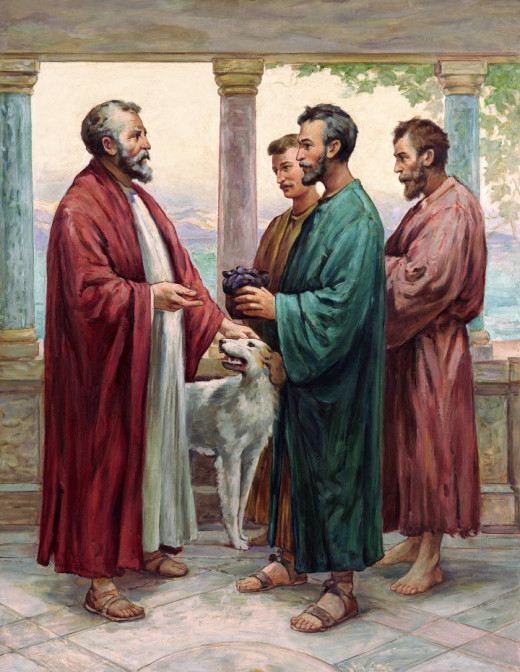
9. Approached the Master: Those servants were not ruminating over the situation of the farm, they did not sit idly by doing nothing, neither did they sit at a place bemoaning what has happened, they took pre-emptive positioning and decide to approach their master.
“So the servants of the householder came and said unto him, Sir, didst not thou sow good seed in thy field? from whence then hath it tares?” (Mat 13:27 (emphasis mine))
The Greek word for “came” here is “προσέρχομαι”, Romanized form is proserchomai (pronounced as pros-er'-khom-ahee) which implies approach, come near, visit, draw near. The meanings given to the word here shows in clear form that those servants were not sleeping at the same place with the master, they have separate apartments, perhaps on the farm or outside the farm. The apartments may be built for them by the master as it used to happen those days.
“And it shall be, when he lieth down, that thou shalt mark the place where he shall lie, and thou shalt go in, and uncover his feet, and lay thee down; and he will tell thee what thou shalt do.
“And when Boaz had eaten and drunk, and his heart was merry, he went to lie down at the end of the heap of corn: and she came softly, and uncovered his feet, and laid her down.
“And it came to pass at midnight, that the man was afraid, and turned himself: and, behold, a woman lay at his feet.” (Rth 3: 4, 7-8 (emphasis mine))
In the above scripture we shall note that the mother in law of Ruth advised her that she should note where Boaz would lie because he sleeps differently from the rest of the servants on the field.
Taking a cue from this, we can say the master here also sleeps at a different place from the rest of the servants. However, they know where he lies at, and they approached him there.
On getting to him, they brought him words concerning what has happened, what they have noticed on the farmland, what has happened to the germinated seeds. The word “said” in the verse is this Greek word “ἔπω”, which if Romanized becomes epō (pronounced as ep'-o) and the word means bring word, call, tell.
They call the attention of the master to what is going on in case he hasn’t noticed it.
10. Are We Missing Something?When those servants got to the man, they asked him “if they were missing something” by what happened on the farm lest they jump the gun, miss the mark and grieved their master. They asked him the question to ascertain themselves before they proffer the solution on their minds to their master. They asked because it is possible that the different germinated seeds could be a new breed of seed that they were not aware of which the master have planted, perhaps before asking them to join him in planting the ones they knew or he would have employed different servants to plant those for him as the parable in Matthew 20 where different servants were employed by the farmer at different times of the day.
Those servants asked their master, “are we missing something?” Did you do something that we do not know about when they asked that “Sir, didst not thou sow good seed in thy field? from whence then hath it tares?” (Mat 13:27b)
11. The Answer Was Negative: their master replied them that he has not done anything secretive, neither has he done anything surreptitious, “everything I have done you were aware of”, he said unto them. He however added that what they were noticing were the works of the enemy, adversary, the person who does not want him to proceed, the person who does not want his farm to excel his.
“He said unto them, an enemy hath done this. The servants said unto him, wilt thou then that we go and gather them up?” (Mat 13:28)
He told them that, that is what enemies do, that their attitude, that is how they work, when they see good things, they would be out to tarnish those things.
12. The Servants Solution: those servants having listened to their master and knowing full well that his progress is theirs’, it is when he is making profits that they would be able to receive their salaries as and when due, they told him that after seeing what happened they have sat on the issue, deliberated seriously on the issue and have some propositions for him if he would approve it. Their master listened attentively to them as they told him what their resolutions were and are only waiting for his authorization to go about the work. “Wilt thou then that we go and gather them up?” (Mat 13:28b) they asked.

13. Harvest in View, He Cautioned Them Against Un-Amendable Error: He cannot but appreciate them for being a very dutiful servants, servants who are mindful of their master’s progress are they. He told them that he has equally thought about the unforeseen development on his farm repeatedly. Having weighed the pros and cons, he has discovered that the demerits associated with the action they suggested outweigh the merits associated with it. Because if the steps suggested were to be taken, they would run at a loss because they would make mistakes and the mistakes that would make would be unamendable ones, it would be permanent which would make them run at a loss and what they thought they wanted to avoid would be what they would be running head long into.
“But he said, Nay; lest while ye gather up the tares, ye root up also the wheat with them.” (Mat 13:29)
For clarification of what he said, he presented to them some points, examples to show what he means.
(a) Unmindful Position: This is the position one is when one has other alternatives. Consider the story of the three Hebrews in Babylon when they were compelled by the king to bow to his idol, those people were not mindful of what the king said, they did not mind his rants because they knew the God they were serving, they knew their God, they knew that he has power to save them, he has power to get them out of the position they find themselves. However, assuming he did not save them they know that they would die a righteous person. Prophet Balaam says, “let me die the death of the righteous, and let my last end be like his!” (Num 23:10) they know they would have a rest at the bosom of the Lord because it is the firm belief of the Jews that there is an after world, there is a world after this world, they thus believed that assuming the king went ahead and throw them into the lake of fire which he did and they died in the process, they would rest at Abraham’s bosom.
“Nebuchadnezzar the king made an image of gold, whose height was threescore cubits, and the breadth thereof six cubits: he set it up in the plain of Dura, in the province of Babylon.
“Then Nebuchadnezzar the king sent to gather together the princes, the governors, and the captains, the judges, the treasurers, the counsellors, the sheriffs, and all the rulers of the provinces, to come to the dedication of the image which Nebuchadnezzar the king had set up.
“Then the princes, the governors, and captains, the judges, the treasurers, the counsellors, the sheriffs, and all the rulers of the provinces, were gathered together unto the dedication of the image that Nebuchadnezzar the king had set up; and they stood before the image that Nebuchadnezzar had set up.
“Then an herald cried aloud, To you it is commanded, O people, nations, and languages,
“That at what time ye hear the sound of the cornet, flute, harp, sackbut, psaltery, dulcimer, and all kinds of musick, ye fall down and worship the golden image that Nebuchadnezzar the king hath set up:
“And whoso falleth not down and worshippeth shall the same hour be cast into the midst of a burning fiery furnace.
“Wherefore at that time certain Chaldeans came near, and accused the Jews.
“They spake and said to the king Nebuchadnezzar, O king, live for ever.
“Thou, O king, hast made a decree, that every man that shall hear the sound of the cornet, flute, harp, sackbut, psaltery, and dulcimer, and all kinds of musick, shall fall down and worship the golden image:
“And whoso falleth not down and worshippeth, that he should be cast into the midst of a burning fiery furnace.
“There are certain Jews whom thou hast set over the affairs of the province of Babylon, Shadrach, Meshach, and Abednego; these men, O king, have not regarded thee: they serve not thy gods, nor worship the golden image which thou hast set up.
“Then Nebuchadnezzar in his rage and fury commanded to bring Shadrach, Meshach, and Abednego. Then they brought these men before the king.
“Nebuchadnezzar spake and said unto them, Is it true, O Shadrach, Meshach, and Abednego, do not ye serve my gods, nor worship the golden image which I have set up?
“Now if ye be ready that at what time ye hear the sound of the cornet, flute, harp, sackbut, psaltery, and dulcimer, and all kinds of musick, ye fall down and worship the image which I have made; well: but if ye worship not, ye shall be cast the same hour into the midst of a burning fiery furnace; and who is that God that shall deliver you out of my hands?
“Shadrach, Meshach, and Abednego, answered and said to the king, O Nebuchadnezzar, we are not careful to answer thee in this matter.
“If it be so, our God whom we serve is able to deliver us from the burning fiery furnace, and he will deliver us out of thine hand, O king.
“But if not, be it known unto thee, O king, that we will not serve thy gods, nor worship the golden image which thou hast set up.
“Then was Nebuchadnezzar full of fury, and the form of his visage was changed against Shadrach, Meshach, and Abednego: therefore he spake, and commanded that they should heat the furnace one seven times more than it was wont to be heated.
“And he commanded the most mighty men that were in his army to bind Shadrach, Meshach, and Abednego, and to cast them into the burning fiery furnace.
“Then these men were bound in their coats, their hosen, and their hats, and their other garments, and were cast into the midst of the burning fiery furnace.
“Therefore because the king's commandment was urgent, and the furnace exceeding hot, the flame of the fire slew those men that took up Shadrach, Meshach, and Abednego.
“And these three men, Shadrach, Meshach, and Abednego, fell down bound into the midst of the burning fiery furnace.
“Then Nebuchadnezzar the king was astonied, and rose up in haste, and spake, and said unto his counsellors, Did not we cast three men bound into the midst of the fire? They answered and said unto the king, True, O king.” (Dan 3:1-6 & 8-24)
Because of this they were in an unmindful position, they were not perturbed by what the king was saying. The king peradventure thought they would be terrified, started panicking and lose their stance, but this did not happen as they stand firm in their belief and faith.
One is in this kind of (unperturbed) position when one has alternative, when one is sure of recovering something back. But this cannot be said of a person who has no alternative. As such the master presented the other option to them, which was mindful position, to clear their minds.
This unmindful position is the position each and every believer in the Lord Jesus Christ occupies on earth, this is because we know we have a place where we are going to after this world, that is why we are not weighed down like the people of the world when we lose some of our earthly possessions in some instances because we know that the world itself passes away and everything in it.
“For we know that if our earthly house of this tabernacle were dissolved, we have a building of God, an house not made with hands, eternal in the heavens.” (2 Co 5:1)
“For he looked for a city which hath foundations, whose builder and maker is God.” (Heb 11:10)
“To an inheritance incorruptible, and undefiled, and that fadeth not away, reserved in heaven for you,” (1 Pe 1:4)
The above bible quotations show the position of each believer in the Lord Jesus as related to our earthly possessions, we do not act as the unbelievers on what we possess because we know the God we serve.
Let us now see the second position that the master showed his servants to buttress home his point, to make what he was telling them to sink into their hearts.
(b) Mindful Position: after observing the close relationships between the tares and the wheat at their foliage stages, he cannot but said he was mindful of what would become the outcome of the step they want to take if they are authorized to take the steps.
“But he said, Nay; lest while ye gather up the tares, ye root up also the wheat with them.” (Mat 13:29)
He was mindful of the outcome because he knows if they are allowed to take the steps, they may angrily do the work and by that would root out the wheats too. Apart from going about the weeding out angrily, even the most cautious person the world over would still make mistakes while weeding out the tares from among the wheats in that position because of the seeming similarities.
When those wheats are rooted out, it would be a major setback, because they would not be able to replant them, in the case of those that could be replanted several efforts would be required to monitor the growth of those plants. For those that couldn’t be replanted, they would have to start afresh, planting new seeds and the time that would be lost they may not be able to recover which would ofcourse result in not having full harvest at the end of the season.
He was particular about the associated loss and he discovered that the loss would be greater than the gains that would accompany the step.
This is God’s position on those who are yet to give their lives to Jesus Christ. God is mindful of those people and he wishes that they would be saved, he wishes that they would come to him through Jesus Christ before it is too late, because if they failed to come to him now, they have everything to lose at the end of the age, there would be no redemption, no salvage, no solution for them there.
Their master added that they do not need to be discouraged neither be disappointed with what he has said, because the time of harvest is near, during the time of harvest things would be easily sorted out among the mixture.
“Let both grow together until the harvest: and in the time of harvest I will say to the reapers, gather ye together first the tares, and bind them in bundles to burn them: but gather the wheat into my barn.” (Mat 13:30)
This man justifies his position as a leader as a master because he thinks before he makes his decision, he was not coerced into making any form of arbitrary decision. Can this be said of our leaders globally?
It is always good to think before we act, as a leader much is expected of us, leaders are expected to be “think-tanks”, because whatsoever decision they made would have larger impact on their followers and the establishments. Are you a thinking leader or you are not? This master showed his uniqueness, you must be a unique leader if you really wish to lead aright your management making your team productive.
Poll Question 1
Are you a leader?
Poll Question 2: Which kind of leader are you?
A thinking leader?
To Sum All Up
We need to be a good leader, we need to put on our thinking caps if we really want to make difference in the world. This man makes difference and his servants couldn’t argue with him because they saw intelligence in what he said, they discovered that he was right and the step they thought should be taken wouldn’t be in the general good of the progress of the establishment.
© 2019 OLUSEGUN

